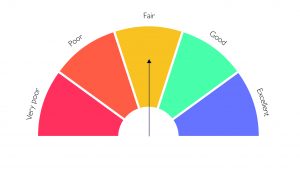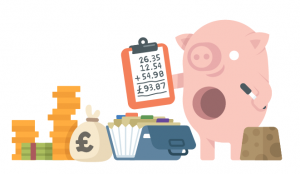Your credit rating determines how much of a risk you represent to lenders. It affects your ability to secure a loan, mortgage, credit, insurance, rentals, even mobile phone contracts and will influence the sort of deal you might be offered.
Building a good credit history will improve your rating and help you get better deals and lower interest rates in the future. Relevant information is compiled in your credit report.

Your Credit Report
What’s in the report?
In the UK, 3 main credit reference agencies (Equifax, Experian and TransUnion) collect public and credit data to produce reports and scores/ratings, based on how well you manage credit and make payments. It includes information like your best, worst and average balance over a year. Missed/late payments stay on your credit report for at least 6 years.
Any form of credit including bank accounts, loans (except your Student Loan), retail store cards and mobile phone contracts will contribute to your credit history.
Who uses credit reports?
When you apply to borrow money or take out a contract (e.g. insurance), the provider will run a ‘credit check’ to predict your likely behaviour: how much you already owe, whether you are keeping up with repayments and if you can afford to borrow more etc. They can then assess whether or how much to lend, and how much interest to charge you.
There is no such thing as a credit blacklist!
Lenders use different criteria, so a rejection from one won’t necessarily mean a rejection from all. If you are rejected, check your credit report, identify the problem and sort it out before applying again.
Build a Good Credit History
New graduates usually have a relatively low credit score, because they don’t have experience of managing credit or paying debts on time. But don’t worry…
To start building up a credit history, you simply need to establish a good track record managing your accounts (e.g. rent, utilities, mobile phone contract, bank accounts).
You don’t need to take out a loan or credit card – save that for when you’re earning a regular income.
A good credit rating is easier and quicker to build up than it is to re-gain, if you fail to pay debts on time and then score badly.

Establish a good track record
Pay bills in full and on time – Most important for boosting your credit score!
Demonstrate reliability: never miss loan/credit payments and always be punctual with rent and utilities bills etc.
Set up Standing Orders and Direct Debits for automatic payments.
How to Set up Direct Debits & Standing Orders – MoneyHelper
Budgeting Account
Consider opening a separate account, to set aside funds for essential bills
If you do have a credit card, keep well under your credit limit. Pay off the full amount, on time, every month.
Overdraft debt may have a negative impact, so it’s generally wise to pay this off as soon as possible. Don’t exceed your overdraft limit.

Student Loan (if taken out since 1998) is not included on your credit file, so it will not affect your credit rating. However your loan should be declared in any credit/loan application, because it will affect your ability to repay other loans.
Register on the electoral roll
You need to be registered to vote at your current address otherwise it can be hard to get any credit.
Check your credit report
Check at least annually, and always before you make applications for a loan, mortgage or credit card.
Access your report online or request a written copy from the main credit reference agencies (sometimes for a small fee):
Inaccuracies can lead to rejection, so make sure personal and contact information is up to date.
Cancel any old, unused cards or accounts to prevent risk of fraud and also because lenders could base their decision on the amount of credit already available to you, rather than just on what you currently owe.
Check for any unfamiliar accounts or amounts, because this could indicate identity fraud.
Find out more:
How To Check Your Credit Report – MoneyHelper
Space out applications
Don’t apply for too many accounts/cards at the same time; it looks desperate and may adversely affect your credit rating.

Get help with financial problems
All bank information is linked, so you can’t escape a bad track record just by switching banks. If you are having problems, talk to your bank straight away, or seek free, confidential advice from a debt advice service.
See Financial Support for where to get help.
Find out more:
Credit Rating – Money Saving Expert
Useful facts & tips to boost your credit score
Improve Your Credit Score – uSwitch

